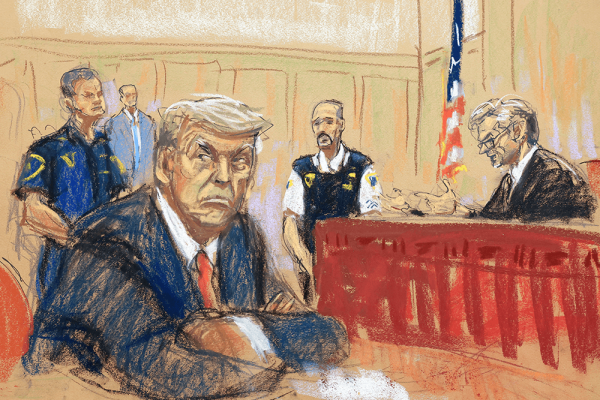On Maundy Thursday of Holy Week, we remember how Jesus and his disciples celebrated the Passover meal, transforming it into what we now celebrate as communion. The word “maundy” originates in the Latin mandatum, in reference to the mandate Jesus gives his disciples that night: “A new commandment I give unto you that you love one another” (John 13:34). Just before the meal, Jesus engages in an act of loving service and humility: washing the disciple’s feet.
This selfless act contrasts sharply with the shameful spectacle that has dominated recent news: the indictment and arraignment of former President Donald Trump. Trump delivered predictable outrage, but it was alarming to see the degree to which a chorus of Republican politicians and 2024 presidential candidates who immediately lambasted the indictment as a “political witch hunt.”
What has filled me with even greater righteous anger is the way many of Trump’s political and religious supporters have hijacked Holy Week, comparing the first criminal indictment of a former president in U.S. history to the passion of Jesus Christ. Rep. Marjorie Taylor Green (R-Ga.), who has proudly proclaimed herself a Christian nationalist, compared Trump’s arrest and arraignment — on charges related to a hush money payment to an adult film star — to both Nelson Mandela and Jesus Christ. In a tweet last Thursday, conservative lawyer Joseph McBride noted: “Donald Trump has been indicted days before Palm Sunday. The same people trying to crucify him want me to stop comparing his suffering to the suffering of Jesus Christ. Not gonna happen. The similarities are glaring. AMERICA’S BEST POTUS. #FREEDONALDTRUMP.” In a nationally televised interview a few days earlier, a Trump supporter read aloud an email she’d sent to district attorney Alvin Bragg, who led the indictment: “[Trump]’s torture brings to mind what Jesus Christ went through to save us. President Trump is our savior in this country. There’s no one else who can make us whole and great again.”
The contrast between Jesus and Trump couldn’t be starker. Instead of embracing Jesus’ call to love our enemies, Trump has consistently sought to denigrate and destroy his opponents, proclaiming in his recent campaign speech: “I am your retribution.” Despite the judge’s directive to Trump to “refrain from making statements likely to incite violence or create civil unrest,” Trump has been lashing out at both the judge and the prosecution since the arraignment. Instead of seeking to pursue and embody truth, Trump has been known for manipulating and abusing truth for his own benefit and will. Trump has become a master in politicizing his legal troubles and playing the role of the perpetual politically persecuted victim in order avoid any culpability and obscure his own position of privilege, wealth, and political power. As Rev. Jacqui Lewis of Middle Collegiate Church in New York City put it over the weekend: “White Christian fascism relentlessly portrays accountability as persecution. Comparing Trump to Jesus reveals contempt for God. What they worship is power.”
The comparison between Trump’s indictment and Holy Week only gets more ludicrous and sacrilegious: While political and religious authorities were only too eager to falsely accuse, try, and execute Jesus in a period of less than a day, the legal entities looking into charges against Trump — including courts in New York, Georgia, and at the U.S. Department of Justice — have moved quite deliberately, with their investigations spanning multiple years. Bragg began his tenure as district attorney by abandoning his predecessor’s investigation into Trump’s business practices out of concern that the case was not strong enough.
Let’s be clear about one thing: The U.S. justice system is far from perfect, and we should not pretend otherwise. The criminal justice system in the U.S. especially fails people living in poverty and people of color, who are prosecuted and imprisoned at highly disproportionate rates. Yet if we believe in the principle of the rule of law and especially the notion that no one — however wealthy, famous, or powerful — is above the law, then we should support criminal proceedings into Trump’s conduct that are conducted fairly, follow the facts, and result in just outcomes for all concerned. Equal justice under the law is a quintessential promise and a test of our democratic system.
Christian ethicist David Gushee wrote powerfully earlier this week on Trump’s indictment and arraignment, comparing him to a figure in Paul’s second letter to the Thessalonians, in which he warns of “the man of lawlessness” (2:2). Gushee, like many of us, finds himself wondering this week whether it is possible that after 50 years of court cases in which Trump has never admitted wrongdoing, “human justice is, at last, to some extent, finally catching up with Donald Trump.” While I wish that the first charges Trump were facing were the Georgia-related election charges or the Justice Department’s investigation into mishandling of classified documents, the judge and jury will have to weigh the evidence that Trump falsified business records and whether these actions rise to a felony because they also are tied to a more serious crime such as violating campaign finance laws.
Holy Week begins with Palm Sunday, where we remember the moment that Jesus enters into Jerusalem riding on a donkey. A crowd greets him with cries of “Hosanna!” and lays palms on the road because they believed he would fulfill their hopes as a political savior. They expected a messiah to deliver them from the subjugation they faced at the hands of the Roman Empire; some may have even expected that deliverance from foreign occupation would result in their own return to power.
But as we know, that wasn’t what happened: After he enters Jerusalem, Jesus immediately challenges religious authority when he goes to the temple and overturns the tables of corrupt money changers who he says have “made the temple into a den of thieves.” Religious leaders then accuse Jesus of blasphemy and, when Jesus refuses to answer whether he is the messiah, Roman leaders charge him with treason — a political crime — and after sham trials, he was executed by the state. Yet through it all, Jesus neither tried to defend himself nor rallied his followers against his opponents; when Peter tries to start a violent revolt, Jesus rebukes him. Just as his public ministry began by rejecting the devil’s temptations of power, fame, and bodily gratification in the desert, Jesus ended his earthly ministry by refusing to play by the rules of the powers that be. Instead, he gave himself up and endured death on the cross to secure a far greater victory over death, sin, and injustice so that we can all experience God’s gift of salvation and liberation. In the process, Jesus becomes the embodiment of selfless and sacrificial love.
As we move through the betrayal of Maundy Thursday, the profound suffering of Good Friday, the deep grief of Holy Saturday, and finally arrive at the profound resurrection joy of Easter Sunday, we must also find ways to replace selfish and egotistical pursuits of power with Christ’s example of sacrificial love. Holy Week teaches deep spiritual lessons that are so desperately needed in our culture and politics today: in God’s kingdom, the first shall be last and as Christ taught “Whoever wants to be my disciple must deny themselves and take up their cross and follow me. For whoever wants to save their life will lose it, but whoever loses their life for me and for the gospel will save it. What good is it for someone to gain the whole world, yet forfeit their soul?” (Mark 8:34-36).
I hope and pray that we too can learn and relearn one of the central messages of Holy Week, how to model Christ’s example of unconditional love and selfless service, which continue to be both countercultural and transformative in our culture and politics today.
Got something to say about what you're reading? We value your feedback!






